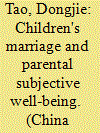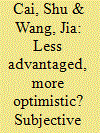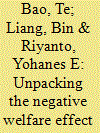| Srl | Item |
| 1 |
ID:
182824


|
|
|
|
|
| Summary/Abstract |
The marriage of children is a milestone event in parenthood, while how parents' well-being evolves around the time children get married is limitedly understood. This paper examines the relationship between children's marriage and parents' subjective well-being. Using China Family Panel Studies (CFPS) data, we find that parental subjective well-being is positively associated with children's marriage. An examination of the underlying mechanisms shows that, first, children's marriage can significantly enhance parents' sense of security in old-age care and their confidence in the future. Second, the older the unmarried children are, the more anxious the parents who hold stronger traditional ideology will be. Third, parents will increase their consumption expenditure after their children get married; and compared with daughters, sons' marriages have a stronger effect on parental well-being. These findings reveal that parental economic pressure due to China's biased sex ratio and marriage squeeze is relieved after their children's marriage.
|
|
|
|
|
|
|
|
|
|
|
|
|
|
|
|
| 2 |
ID:
166710


|
|
|
|
|
| Summary/Abstract |
Evidence and conventional wisdom suggest that general poverty has a negative effect on the well-being of individuals. However, the mechanisms through which this effect occurs are not well-understood through economic approach. In this paper, we analyse the influence of general and fuel poverty as well as the social dimension through peer comparison on the subjective well-being of households. We develop a novel approach to analyse fuel poverty and well-being based on consumer theory. Individual preferences are modelled using indifference curves and a distance function where the preferences of individuals are affected by their poverty status. We use the survey data from the official Spanish Life Condition Survey for 2013, which contains over 16,608 observations on household members. The results show that both general and fuel poverty influence the reference indifference curve but that individuals also compare themselves with their peers. The proposed model also allows us to corroborate how general and fuel poverty affect well-being and how effective policies can be designed to improve social welfare.
|
|
|
|
|
|
|
|
|
|
|
|
|
|
|
|
| 3 |
ID:
163334


|
|
|
|
|
| Summary/Abstract |
Using a recent national dataset from the China Family Panel Studies, this study provides new evidence regarding the subjective well-being puzzle across multiple indicators among rural, migrant and urban populations in contemporary China. The results show that rural people on average have higher levels of life satisfaction than do migrants or urban residents, despite their disadvantaged economic situations. The decomposition analyses reveal that subjective social status plays a substantial role in accounting for group disparities in life satisfaction, whereas objective social status and experiences of social mobility have less explanatory power. These findings suggest the importance of within-group comparison in shaping individuals' well-being in segregated societies such as China.
|
|
|
|
|
|
|
|
|
|
|
|
|
|
|
|
| 4 |
ID:
147421


|
|
|
|
|
| Summary/Abstract |
The paper investigates the impact of remittances on the relative concerns of households in rural China. Using the Rural to Urban Migration in China (RUMiC) dataset we estimate a series of subjective well-being functions to simultaneously explore relative concerns with respect to income and remittances. Our results show that although rural households experience substantial welfare loss due to income comparisons, they gain well-being by comparing their remittances with those received by their reference group. In other words, we find evidence of a “status effect” with respect to income and of a “signal effect” of similar magnitude with respect to remittances. This finding is robust to various specifications, alternative reference group definitions, controls for the endogeneity of remittances and selective migration, as well as the use of migrants' net contribution to household income.
|
|
|
|
|
|
|
|
|
|
|
|
|
|
|
|
| 5 |
ID:
182796


|
|
|
|
|
| Summary/Abstract |
Recently, concerns have been raised on the adverse impacts of social media on people's subjective well-being. Using a large and representative sample of Chinese individuals, we explore the effects of social media browsing and social media communication on users' life satisfaction. The results show that while social media browsing has a strong negative impact on users' subjective well-being, there is no significant impact generated by social media communication. The relative income and social comparison are the main drivers of the result. The negative impact of social media browsing is more pronounced for low-income people than for high-income people. We do not find support for other possible mechanisms like information cocoons of information fragmentation.
|
|
|
|
|
|
|
|
|
|
|
|
|
|
|
|